Morning Yoga Stretches Routine
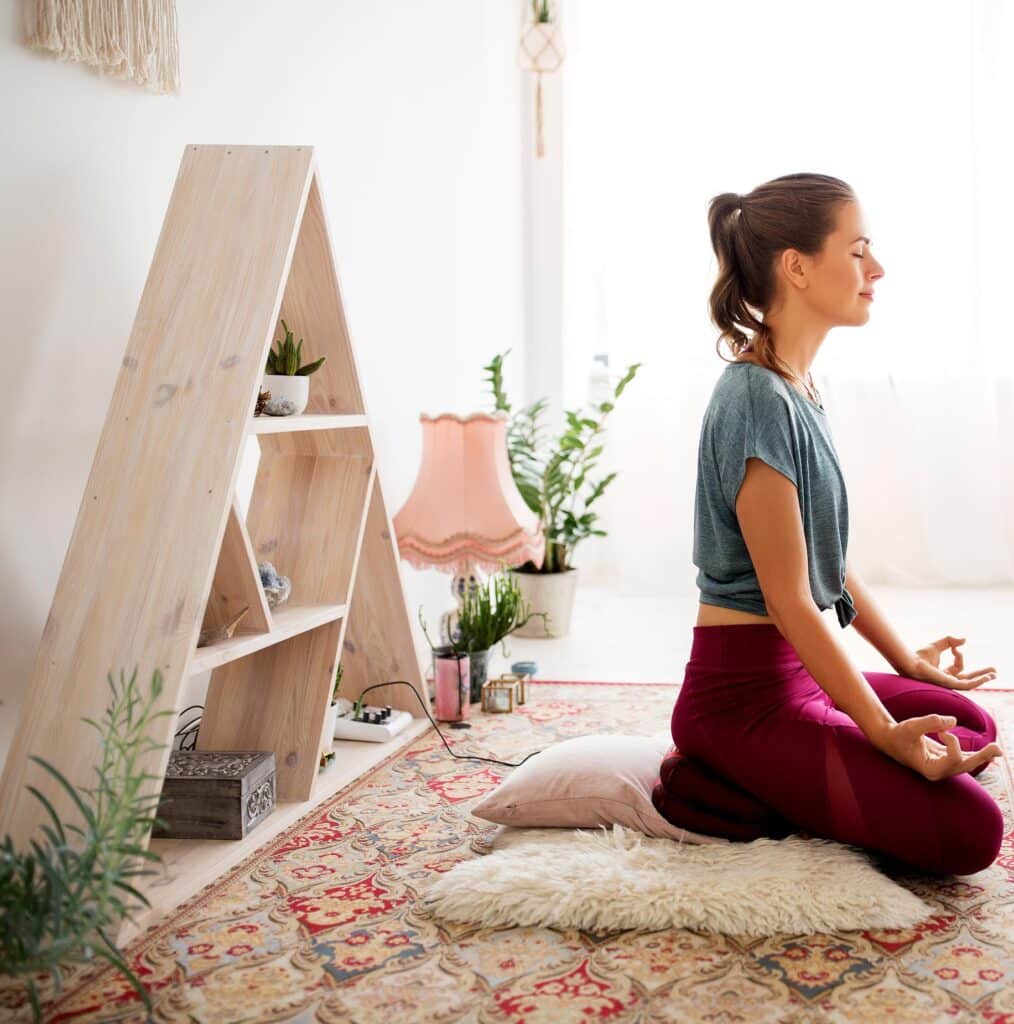
Just imagine: instead of starting your day feeling tired or stressed, you can move into your day refreshed and calm, with just 15-20 minutes of morning yoga stretches.
Yoga is a healing practice no matter what time of day you choose to do it, but there are a few things about morning yoga that are especially powerful.
- A morning routine allows you to gently wake up your mind, body and spirit: to clear away mental fog, stretch and energize stiff muscles after sleep, and rest in a deep sense of well-being.
- When you just wake up, you’re in a more receptive state than at other times of day. When your first experience of the morning is a mindful yoga session, the effects soak deeply into your mind and body. What a different way to begin your day than tuning into social media or world news!
- Starting your day with the self-care, mindfulness and physical awareness of yoga, you will automatically carry these qualities and intentions into whatever you do in your day.
- You are making a conscious decision to start your day with presence and mindfulness. You create a space for recognizing your being, instead of only your doing.
Practicing Daily Living Through Yoga
You can also use your yoga morning routine to explore a particular challenge or habit mindfully.
For example, in your daily life, do you tend to exhaust yourself by pushing past your limits? As you do the poses, you can watch what happens when you reach a physical limit. How do you respond when you cannot go as deeply as you expect in a pose? Do you listen and respond mindfully or do you want to ignore your body’s signals and push through?
Or maybe you tend to the opposite: you withdraw when you feel a bit of challenge. You do not trust your ability to stand up to a challenge successfully. In your yoga, you might choose to practice a little perseverance, holding a pose a few seconds longer, finding a place of relaxation and resilience you may be surprised to find.
You can be also be direct about linking the benefits of your practice to a current stress in your life. For example, you might say to yourself, “This feeling of relaxation and clarity after doing yoga is amazing. Maybe I can remember this feeling at our staff meeting today.”
Yoga practice is a way to be present and mindful with how you usually (and often unconsciously) do things in everyday situations. Once you “see” this, you can gently practice new and health-promoting ways of responding and acting.
General Benefits of Yoga
Apart from the special benefits of practicing in the morning, here are just some of the benefits of a yoga practice.
- Integration of mind, body and spirit.
- Relaxation and strengthening of the whole body.
- Boosting of the immune system.
- Increased blood and oxygen flow.
- Improved balance and joint health.
- Increased mental clarity.
- Promoting of healthy breathing.
- Getting just what you need. If you wake up feeling anxious, do some yoga. If you wake up feeling groggy, do some yoga. This is one of the unique qualities of yoga! Because it affects our whole mind, body and spirit, it has a way of bringing them all into balance.
Some Tips for Doing Yoga Practice
How you do yoga matters. Yoga, and especially morning yoga, is not about holding a pose longer or deeper than you did yesterday.
- Respect your limits. Pay attention to what is happening in your body, your mind, your emotions–and try to pay attention to all equally. Go at your own pace, doing your best to notice any obvious and subtle effects of the movements.
- Pay attention to your breath! Notice if you’re holding your breath in a pose. Be aware of the full inhale and exhale cycle of your breath.
- Stop if you feel any pain. Always. Especially in the morning, you may be a little stiff, so move slowly and gently until your body warms up.
- Connect with ease. If you’re frowning during your morning yoga stretches, you are not in an ideal frame of mind! Morning yoga is for discovering ease and even joy in the subtle movement and awakening of your body and mind.
- If you can, hold each pose long enough to feel a moment of release. If you’re new to yoga or are particularly tight, this may take your whole session! That is OK because it is important to experience a shift from tension to relaxation, however slight.
- Many poses have an energetic or emotional aspect to them, like alertness or surrender. See if you can notice if a pose evokes this kind of response in you.
- If a pose works one side of your body, always work the other side too.
Your Morning Yoga Routine
In this morning yoga stretches tutorial, you will see a range of poses that engage all parts of the body, as well as some that embody a certain state. In Warrior II, for example, you can’t help but feel, well, like a Warrior! And you just might bring some of the Warrior into your activities of the day.
There are eight poses in the routine that can be done in 15-20 minutes–or for longer if you like! We recommend you do at least five, taking as much time as you like with each pose, especially those that resonate with your body or mind. Remember that yoga is a practice designed to strengthen your body-mind connection. So, pay attention to what the poses tell you–which create relaxation, resistance, rejuvenation, and so on.
We suggest that you begin and end your routine with one minute of Mountain Pose.
We give a short description of each pose below, but if you would find pictures helpful, you can see illustrations of these poses at https://www.pocketyoga.com/pose/.
Poses
Mountain Pose. Stand tall and strong, rooted in the earth
Floor poses:
- Cat + Cow. Awaken your spine from tailbone to head
- Half Pigeon. Open your hips and lower back
- Seated Twist. Stretch your ribcage and upper body
- Shoelace with Eagle Arms. Release tension throughout your shoulders, neck and arms
Standing poses:
- Triangle. Get a full body stretch
- Wide leg forward fold. Enjoy another great opener for shoulders, arms and lower back
- Warrior II. Strengthen your whole body and embody the warrior!
Mountain Pose
Description of the Poses
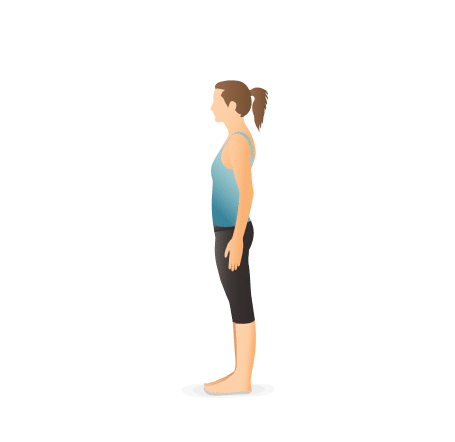
Mountain Pose
- Stand with feet together, arms resting loosely at your sides.
- Feel the full surface of your feet contacting the ground. Make any adjustments to feel stable and balanced.
- Have a gentle feeling of uplift in your ribs and spine.
- Relax your shoulders and slightly tuck your chin.
- Gaze straight ahead with eyes relaxed.
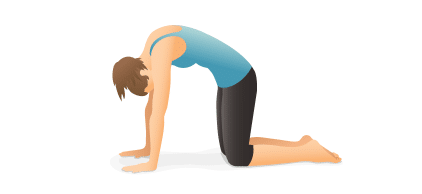
Cat + Cow
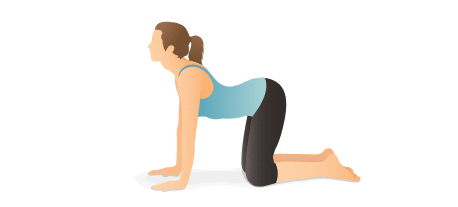
- These two poses are often done together to flex the spine in two directions.
- Move onto your hands and knees for Cat pose, body in alignment, with your hands directly below your shoulders, and knees below your hips.
- Balance your weight between your hands and knees.
- On an inbreath, arch your spine up, pulling your belly in.
- Tilt your head so the crown is pointing toward the floor, with neck relaxed. Feel the weight of your head stretching your neck and spine.
- Slowly transition into Cow pose with an outbreath, gently arching your spine in the opposite direction: tailbone pointing up, and tilting your head and eyes upward.
- Alternate between Cat and Cow as many times as you like.
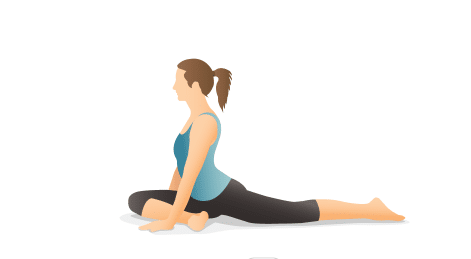
Half Pigeon
- From a position on the floor, move one knee so it is under you and at 90 degrees from your body. If 90 degrees is a challenge, find the position that provides a comfortable stretch.
- Rest your foot near the groin.
- Extend the other leg straight behind you, with the top of your foot resting on the floor.
- Aim to have your hips parallel and facing forward.
- With hands flat on the ground, or on fingertips, raise your upper body gently, with ribcage expanded and spine erect.
- You can deepen the pose at any time by creating a deeper angle in your bent leg or stretching your upper body a bit more.
- Repeat the pose switching legs.
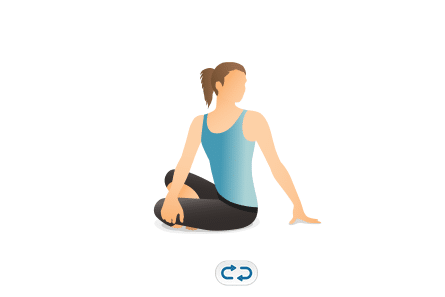
Seated Twist
- Sit cross legged on the floor.
- Place your right palm on the outside of your left knee.
- Keeping your spine straight, twist slowly to the left and place your hand on the floor behind your right hip, or as close as you can without strain.
- Look over your left shoulder.
- Switch sides.
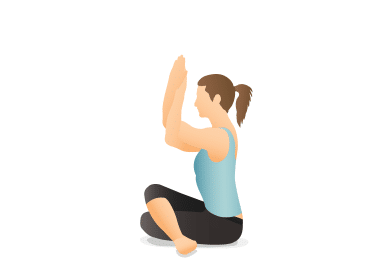
Shoelace with Eagle Arms
- Start this seated pose with your knees closely on top of each other in front of you, and your feet resting on the floor.
- Bend your arms in front of you and bring your right elbow over your left.
- Wrap your left hand around your right, so your palms meet and your forearms are intertwined. If this is difficult, adjust the pose so the backs of your hands are together.
- When you have this position, gently raise your elbows to shoulder height.
- You can deepen the stretch by raising your elbows higher and moving your hands away from your body.
- Switch sides.
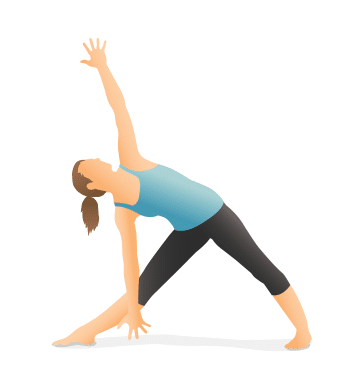
Triangle
- Start in a standing position, with legs wide apart.
- Rotate your hips outward away from each other, and turn your left foot out from your body 90 degrees and your right foot inward about 60 degrees.
- Stand with your ribs tall and arms outstretched. Slowly start to tilt your upper body to the left, keeping your arms aligned with your shoulders.
- Lower your body until your left hand is on or near the ground, and your right pointing toward the sky. Spread your fingers.
- Keep your spine straight. Try not to collapse at the waist.
- Focus gently in front of you.
- Repeat the pose on the other side.
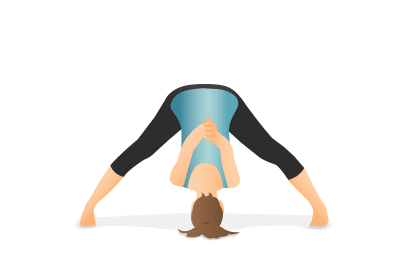
Wide Leg Forward Bend III
- Stand with feet wide apart, toes turned slightly in and clasp your hands behind your back with fingers interlaced.
- Press your shoulder blades together slightly and start to bend forward at the hips, keeping your back straight.
- As you lower your upper body, let your head come toward the ground and your hands rise upward toward the ceiling.
- Bring your weight slightly forward as needed for balance.
- Relax your neck to feel the weight of your head.
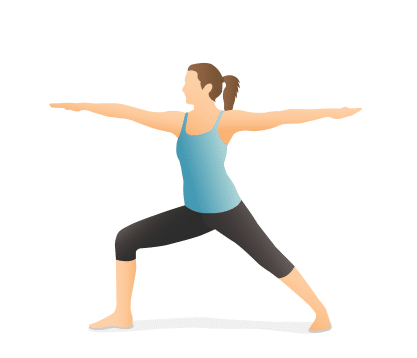
Warrior II
- In standing pose, spread your feet in a wide stance.
- Turn one foot to the side, bending the knee to 90 degrees. The back leg is outstretched straight, with the foot angled in at about 60 degrees. Anchor the outside edge of your foot to the floor.
- Raise both arms so they are level with your shoulders and on the same plane as your body.
- Rotate your thighs outward to open the hips.
- Squeeze your shoulders together, point your fingers and gaze along your forward arm.
- Switch sides.

Mountain Pose
Finish with one minute of Mountain Pose, noticing how your body and mind are affected by your practice.
Well done!
Conclusion
Our morning yoga stretches routine and tutorial will help you wake up and feel great!
Whichever poses you choose to try as your morning yoga, please remember that the how of yoga is the most important. Be curious and gentle as you practice. Respect your limits and pay special attention to your breath. Your breath will always tell you what you need to know: if you’re holding your breath, pushing too hard or right in the sweet spot of mindful movement.
A morning yoga routine is a simple way to give yourself the gift of mindfulness and well-being. In just a few minutes, you can establish yourself in your most resourceful self to meet the challenges of the day.
For more guidance on practicing yoga, we have lots of resources for you at Mindfulness Exercises: https://mindfulnessexercises.com/?s=yoga.
Live each day in the moment with Mindfulness Exercises!













